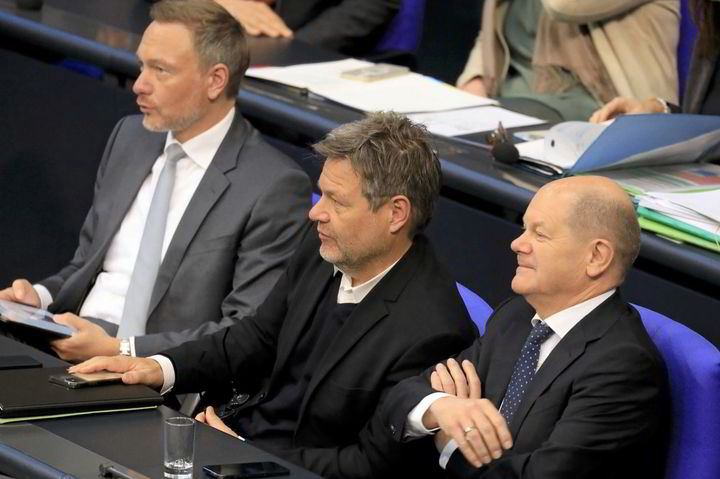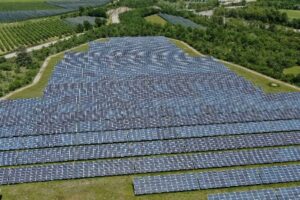Germany does not know how it will fund its green hydrogen plans after court removes €60bn from federal budget

The status of the German government’s green hydrogen plans is unclear after the country’s constitutional court ruled earlier this month that the transfer of €60bn to the Climate and Transformation Fund (KTF) — which was due to finance a range of clean energy initiatives — was unconstitutional.
Hydrogen Insight asked the German ministry for Economic Affairs and Climate Action (BMWK) how the ruling would affect the funding of schemes such as the H2Global programme, which aims to subsidise imports of green hydrogen, but a spokesperson was not able to say.
Speaking on behalf of economics and climate minister Robert Habeck, she told Hydrogen Insight: “As a federal government, we are currently looking closely at the implications of the Federal Constitutional Court’s ruling and are working together to find ways of continuing with the measures we are seeking to implement.
“Given the complexity of the task, this will take time and care. Please understand that we are not yet in a position to make precise statements about individual programmes and investments. We will let you know as soon as we have more information. The Federal Government is working intensively on solutions.”
In August, the German cabinet agreed to allocate €18.6bn from the KTF to hydrogen initiatives between 2024 and 2027, with €3.8bn of that due to be spent next year, as part of the federal budget for 2024.
It was not spelled out how that money would be allocated, but national hydrogen programmes include a new 9,700km H2 pipeline network by 2032, tenders for hydrogen-fired power plants, annual auctions for green H2 produced from offshore wind, a goal of producing 10GW of green hydrogen production by 2030, while importing a lot more through its H2Global scheme, as well as a planned big-budget Carbon Contracts for Difference scheme to support industrial users switching to renewable H2.
Article continues below the advert
However, a parliamentary vote to approve next year’s budget was cancelled last week, with the Bundestag budget committee arguing that a new national budget must now be drawn up due to the court ruling, with potential repercussions for hundreds of billions of euros of previously planned spending commitments across every government department.
And now it is not clear which hydrogen programmes will be able to go ahead as planned.
The climate fund also receives the proceeds from the sale of emissionscertificates bought by polluting industries and from a CO2 levy on fossil fuels, but that is not nearly enough to compensate for the now missing €60bn.
What was the court’s decision and why was it taken?
Germany’s constitutional court issued its ruling on the €60bn from the KTF on 15 November, around 18 months since the case was first filed by the former Chancellor Angela Merkel’s party, the Christian Democratic Union (CDU).
The problem was that the €60bn had originally been authorised for emergency measures to fight the Covid-19 pandemic and its economic fallout, but it had not been needed for that purpose, so was then diverted into the new climate fund.
But according to the German constitution, the federal budget must be balanced every year, with new debt limited to 0.35% of GDP, under what is known as the “debt brake” (Schuldenbremse in German). The only exceptions to this rule — for debt to go beyond this 0.35% limit — are in the event of a natural disaster or other extraordinary emergency situation.
The court ruled that the €60bn of finance could legally only apply to Covid-related spending, not energy transition funding — effectively wiping the entire sum from the federal climate budget in one swoop.
This money had also been earmarked for subsidies to expand renewable energy, insulate buildings, electric-vehicle charging, and help with funding fossil-free heating.
The government cannot borrow an extra €60bn to make up for the loss, as that too would fall foul of the Schuldenbremse rules. So the only way to find that amount of money — and still balance the budget would be to raise taxes or make budget cuts elsewhere.
But perhaps the biggest problem facing the governing coalition in the short term is that its most junior partner is the Free Democratic Party (FDP), which sees itself as opposed to any policies that raise taxes or costs for the middle classes.
Many in Germany have speculated that the court’s ruling will lead to increase government in-fighting as the FDP is likely to attempt to block policies from its larger partners — the Social Democrats of Chancellor Olaf Scholz and Habeck’s Greens — that aim ro raise €60bn of new funding. This could in turn lead to the collapse of the so-called “traffic light” coalition.
Jorgo Chatzimarkakis, CEO of trade association Hydrogen Europe, told Hydrogen Insight last week that the German government needs to find a solution “very fast”.
“Because some industries will say, ‘okay, Germany is obviously not an interesting place [to do business] anymore, let’s go directly to Mauritania or Namibia and build our projects there. That’s the consequence. But it also affects wind, it affects solar, it affects everybody, all clean tech.”






